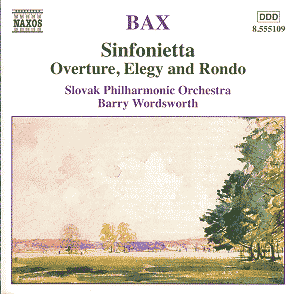In its short playing time this issue betrays
LP origins. It was issued four years after the BBC's sumptuous
centenary celebrations in 1983. Indeed the Sinfonietta was included
in those celebrations in a studio broadcast conducted by the BBC
Welsh Symphony orchestra/Vernon Handley on 23 December 1983.
The present disc was first issued at full price
on Marco Polo 8.223102. Resplendent in new livery (James Hay's
cover painting) and strengthened by Lewis Foreman's superb notes
it now moves into bargain price alongside the Lloyd Jones-conducted
symphonies. It forms a most apt appendix to the symphonies. Both
works are little symphonies and neither are completely light-hearted
or trivial. Bax did write works with a Coatesian levity (the unrecorded
Overture Work-In-Progress) but when the triptychal work
moves away from vintage Bax it slips into the pastiche Strauss
of the Overture to a Picaresque Comedy and the finale of
the Violin Concerto. The works have many Bax fingerprints and
show imaginative mastery time after time. However the themes remain
obstinately unmemorable - often magically orchestrated and placed
but refusing to hook themselves into the memory. The recording
quality is much better than I had remembered and the evidence
of its excellence can be heard at the start of the Overture
and the Rondo which display depth and impact. You should
also hear the resinous chamber qualities at 3.32 during the first
episode in the Sinfonietta. Bax's tendency to ruminate
and meander fatally saps the momentum in the centre of the Rondo
and in the glutinous Elegy. Lewis Foreman's notes speak
of a neo-classical accent to the Overture but it does not
register with me nor for that matter does it in another work reputed
to be affected in this way - Moeran's Sinfonietta.
By the way the Bax style adopted here is not
exotic-impressionist (Spring Fire) neither is it brutal
and barbaric (First Symphony). This is the Bax of the Fourth and
Fifth Symphonies - a sort of transition between the rumbustious
nature-painting of the Fourth and the Nordic genius of Winter
Legends and the Fifth Symphony. The Sinfonietta is
in three sections continuously played. The first mixes Bax's hallmark
liturgical mood with the stertorous savagery typical of his Nordic
chapter. Nice touches heard here and there including the stalking
tic-toc of the bassoon at 1.32 in the Tempo Primo (tr.5).
Not the place to start your Bax exploration but
those who have caught the bug will find much to please them in
these two quasi-symphonic works. They are crackingly performed
(allowing for the odd queasy moment) and well recorded.
Rob Barnett
